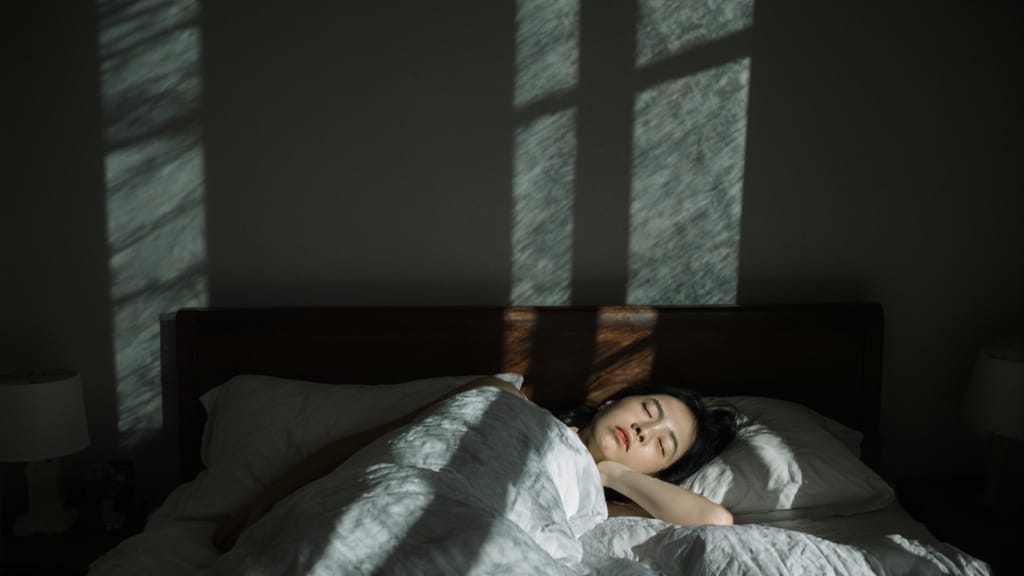News
The Important Question Doctors Will Ask About Your Eczema, And It Has Nothing To Do With Your Skin
When we think about eczema, the image that often comes to mind is one of red, inflamed, and itchy patches of skin. Naturally, doctors tend to focus on these visible symptoms when assessing the severity of your condition.
But, one thing that doctors want to know about your eczema has very little to do with how your skin looks.
Instead, they hone in on a much less obvious but deeply telling factor: your sleep quality.
For many living with eczema, night time doesn’t bring the relief one might hope for. Many eczema sufferers say that their itchiness worsens at night, leading to significant disruptions in their sleep.
Part of it could be due to circadian rhythms. This nocturnal itch can feel relentless, making it hard to fall asleep or stay asleep, and often results in multiple awakenings throughout the night.
Why does this matter? Because poor sleep doesn’t just leave you tired the next day. It directly impacts how your eczema behaves and how well you can manage it.
Sleep deprivation can weaken your immune system, increase inflammation, and elevate your sensitivity to itch, creating a vicious cycle that makes eczema worse.
Yet, despite its critical role, sleep quality is often overlooked when considering the overall severity of eczema.
By paying attention to how well (or poorly) you sleep, you unlock a hidden but essential clue about the true impact of your eczema and open the door to more effective management and healing.

Why Sleep Is A Key Indicator of Eczema Severity
Every eczema sufferer knows that their itch seems to get worse in the evening and night. At night, skin barrier function tends to weaken, making the skin more vulnerable to dryness, irritation, and itch. Add to that the quiet and fewer distractions at bedtime, and you become more aware of every little itch, often amplifying the discomfort.
This nocturnal itch isn’t just inconvenient. It’s a sign of what’s happening beneath the surface. Inflammation flares up, and tissue damage accumulates as scratching worsens the skin barrier disruption. This cycle creates a perfect storm, causing restless nights and making it incredibly challenging to get restorative sleep.
That’s why healthcare professionals also ask questions about sleep to understand the severity of eczema. Validated assessment tools like the Atopic Dermatitis Control Tool (ADCT) and the Patient Oriented Eczema Measure (POEM) include specific questions about sleep disturbances.
During a flare-up, eczema sufferers often experience:
- Insomnia or difficulty falling asleep due to persistent itching.
- Multiple awakenings caused by the sensation of itch or scratching.
- Restless scratching during sleep that perpetuates skin damage.
- Morning symptoms like skin trauma and bleeding from overnight scratching.
Recognising the critical link between eczema and sleep, you can focus on breaking this vicious cycle to protect your skin and get your rest.
Real-Life Impacts: The Hidden Struggles Behind the Skin
Living with eczema is more than just dealing with the visible flare-ups. It’s also about navigating the exhaustion and frustration that come from sleepless nights.
“Eczema affects my sleep quality,” said Ms. Ursula Soh, founder of the Eczema Support Group Singapore (ESGS). “When my sleep is disrupted, I wake up with headaches, which makes it hard to have a good day.”
These sleepless nights don’t just wear down your body, they take a serious toll on your emotional well-being, leaving you anxious about facing another day exhausted and in discomfort.
Soh’s experience is all too common among those with eczema. The cycle is cruel and unrelenting: poor sleep fuels inflammation, which aggravates the skin, leading to more itching and scratching. This worsens the eczema symptoms, which then further disrupt sleep. Over time, this repetitive loop builds up not only physical fatigue but also emotional stress, anxiety, and sometimes even depression.
John, another eczema sufferer, describes his experience: “I’d wake up and the bed would be covered in skin and blood. I had to take two to three shirts to work because the blood would get on my clothes. This condition just zaps all your energy”.
This cycle of itching and sleeplessness compounds daily challenges, making it harder to manage eczema effectively. So for many, improving sleep quality can lead to significant improvements in eczema management and overall quality of life.

Practical Steps to Improve Sleep When Living With Eczema
Improving sleep when you have eczema can feel like a daunting challenge, but small changes to your bedtime routine and environment can make a significant difference. Here are some practical steps that many eczema sufferers have found helpful in achieving more restful, itch-free nights.
Establish Consistent Sleep Hygiene
A regular sleep schedule sets the stage for your body to wind down naturally. Try to go to bed and wake up at the same times every day—even on weekends. This consistency helps regulate your internal clock, which can lessen nighttime itchiness associated with eczema.
Temperature control is equally important. Keeping your bedroom cool and comfortable in our humid climate helps reduce sweating and heat that often trigger flare-ups. Unfortunately, this usually means using the aircon every night, which brings its own set of problems, such as dry air.
In addition, using breathable, lightweight bedding and pajamas designed for sensitive skin can keep you comfortable throughout the night.
Eczema-Specific Bedtime Habits
Certain habits can directly reduce irritants and soothe your skin as you get ready for bed:
- Keep Pets Out of the Bed: While furry companions are comforting, pet dander can exacerbate eczema. Banning pets from your sleeping area helps minimise exposure to these airborne irritants.
- Calming Massage: If you have a loved one willing to help, a gentle massage before bedtime can work wonders. The rhythmic, soothing touch relaxes muscles and calms the nervous system, making it easier to unwind and potentially reducing the intensity of nighttime itching.
- Use Silk Sheets: Unlike traditional cotton, silk sheets create less friction and irritation on sensitive or inflamed skin. They’re naturally hypoallergenic and gentle, reducing the chance of aggravating eczema-prone areas as you move during sleep.
Keep Bedding Fresh and Clean
Regularly washing your bedding helps keep allergens and irritants at bay. Choose a fragrance-free, hypoallergenic detergent to avoid harsh chemicals that might trigger skin reactions. After washing, a double rinse cycle ensures that residues don’t linger on your sheets, which could irritate sensitive skin.
Aim to wash pillows, mattress covers, and sheets at least once a week. Using allergen-proof covers can further protect your sleep environment from dust mites and other triggers.

Use an Air Purifier
Indoor air quality plays a crucial role in eczema management. Dust mites, pet dander, pollen, and other airborne particles can worsen symptoms, especially while you sleep. An air purifier equipped with a HEPA filter can effectively reduce these irritants, creating a cleaner, calmer sleeping environment that supports better skin health.
Complement Sleep Practices with Core Eczema Care
While these bedtime tips form a solid foundation for better sleep, they work best when combined with your daily eczema care routine. This includes:
- Gentle Cleansing: Use mild, fragrance-free cleansers designed for sensitive skin to remove impurities without stripping moisture.
- Moisturising: Apply emollients, oils, or creams immediately after bathing to lock in hydration and protect the skin barrier.
- Protective Clothing: Choose soft, breathable fabrics that minimise irritation and prevent scratching during the night.
Together, these combined strategies address both the symptoms and environment of eczema, helping to break the cycle of nighttime itch, poor sleep, and worsening skin flare-ups.
When you improve your sleep quality, you’re actually helping to reduce inflammation and lessen your sensitivity to itch, which are key drivers of eczema flare-ups.
Inflammation is the underlying culprit in eczema. During restful sleep, your body releases anti-inflammatory signals that help calm immune responses. This is crucial because when inflammation goes unchecked, it damages the skin barrier, making it more prone to irritation and dryness. Better sleep supports the repair of this barrier by allowing your skin cells to regenerate more effectively overnight, leading to healthier, stronger skin that resists flare-ups.
At the same time, when you’re well-rested, your nervous system is less reactive, and the urge to scratch diminishes, breaking the cycle of itch and damage that keeps eczema active.
Sleep is Part of Treatment
Doctors understand this intimate connection between sleep and eczema control. When they ask about your sleep quality, they aren’t just being thorough, they are assessing how your condition is truly managed beyond what meets the eye.
So, try the practical sleep-improving strategies we’ve covered above. These changes, alongside your regular skincare routine, can significantly reduce nighttime itch and help you wake up feeling more refreshed and comfortable.
Resources
Managing eczema and improving your sleep go hand in hand, and Skinshare.sg is here to support you every step of the way. To help reduce nighttime itch and protect your sensitive skin while you rest, we recommend a curated selection of gentle skincare products and protective clothing designed specifically with eczema sufferers in mind:
- Gentle Cleansers: Disinfect and cleanse effectively without stripping your skin’s natural oils, setting the foundation for a calm, well-moisturised sleep routine.
- Natural Oils: Emu oil products are designed to absorb quickly and reduce inflammation from within.
- Moisturisers and Emollients: Our range includes fragrance-free creams and ointments that deeply nourish your skin overnight without irritation. These help lock in moisture and strengthen your skin barrier.
- Comfortable Clothing: The soothing softness of our gloves and arm/leg sleeves help minimise friction and reduce irritation, allowing you to sleep peacefully without aggravating your eczema.
Remember, improving sleep is a powerful step in your eczema care journey. Let Skinshare.sg be your trusted companion as you take control of your skin health and reclaim restful nights.
